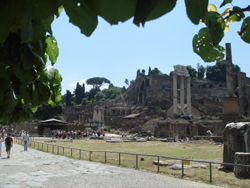Bellinzona is a much overlooked destination in Switzerland - most people pass through hurrying along to the towns and cities on the lakes. That's their loss. Bellinzona is home to three UNESCO listed castles all of which are worth to visit.
-
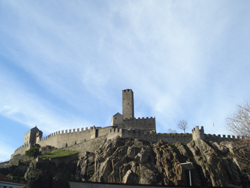 Castelgrande -
the Castelgrande is the most majestic of the three castles
and a natural location to build a castle. At the entrance
to three Alpine passes,
Bellinzona
is at a strategically
important location - hence the need for a large fortress
atop a large rock with a sheer cliff face on one side,
a steep slope on the other and a plateau above. Climb
the Black and White Towers for great vistas over the
town and through the valleys. This must have been how
they looked out over their domain in the olden times.
The enjoyable museum takes you through the history of
the Castle and
Bellinzona
from the 1st century to present
day. Do walk down for fantastic views over the old town
and of the other castles.
Castelgrande -
the Castelgrande is the most majestic of the three castles
and a natural location to build a castle. At the entrance
to three Alpine passes,
Bellinzona
is at a strategically
important location - hence the need for a large fortress
atop a large rock with a sheer cliff face on one side,
a steep slope on the other and a plateau above. Climb
the Black and White Towers for great vistas over the
town and through the valleys. This must have been how
they looked out over their domain in the olden times.
The enjoyable museum takes you through the history of
the Castle and
Bellinzona
from the 1st century to present
day. Do walk down for fantastic views over the old town
and of the other castles. -
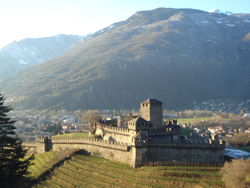 Montebello -
The second of
Bellinzona's
three Castles, Montebello is
no less impressive (albeit less dramatically set) than
the Castelgrande. Higher than the Castelgrande, the Castle
is now surrounded partially by vineyards growing what
I suspect to be Merlot - for which the Ticino region
has become known since the early 20th Century. The ramparts
which once linked the three castles, and provided a defensive
wall across the valley floor, are most clearly visible
from the Montebello Castle and the route to town - although
sections are still clearly visible within the town itself.
The museum houses a rare 13th century Baptismal
font and several 13th and 15th century
capitals. There's also a collection of ceremonial and
military arms.
Montebello -
The second of
Bellinzona's
three Castles, Montebello is
no less impressive (albeit less dramatically set) than
the Castelgrande. Higher than the Castelgrande, the Castle
is now surrounded partially by vineyards growing what
I suspect to be Merlot - for which the Ticino region
has become known since the early 20th Century. The ramparts
which once linked the three castles, and provided a defensive
wall across the valley floor, are most clearly visible
from the Montebello Castle and the route to town - although
sections are still clearly visible within the town itself.
The museum houses a rare 13th century Baptismal
font and several 13th and 15th century
capitals. There's also a collection of ceremonial and
military arms. -
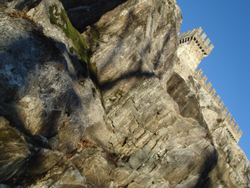 Castel
Sasso Corbaro - Of the three Castles, Castel Sasso
Cobaro is the only one which is not connected to the
city walls. It is the highest of the three castels
and, as a result, has some of the best vistas - and
that's saying something. It seems to be perched precariously
above the town - an attribute, perhaps, of its comparativly
diminutive stature. Originally built to close a gap
in the defensive structure and multiple lighting strikes
in during the 16th and 17th century,
by the early 19th Century the Castel was
falling into ruins. So it's remarkable that the structure
survives at all.
Castel
Sasso Corbaro - Of the three Castles, Castel Sasso
Cobaro is the only one which is not connected to the
city walls. It is the highest of the three castels
and, as a result, has some of the best vistas - and
that's saying something. It seems to be perched precariously
above the town - an attribute, perhaps, of its comparativly
diminutive stature. Originally built to close a gap
in the defensive structure and multiple lighting strikes
in during the 16th and 17th century,
by the early 19th Century the Castel was
falling into ruins. So it's remarkable that the structure
survives at all. -
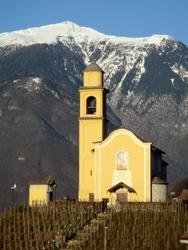 Walk
up to or down from any of the Castles - All the
Castles are set above the town itself, they all command
excellent views over the surrounding area. Walking
up to or down from them commands nothing less than
spectacular vistas of the local surrounds. My personal
favorite descent is from the Castel Sasso Corbaro which
provides excellent views of the surrounds (such as
the church against snow-capped mountains pictured)
but views of the larger castles from an assortment
of angles which allows one to appreciate the thought
processes that might have gone into the location and
construction of such wonderful structures.
Walk
up to or down from any of the Castles - All the
Castles are set above the town itself, they all command
excellent views over the surrounding area. Walking
up to or down from them commands nothing less than
spectacular vistas of the local surrounds. My personal
favorite descent is from the Castel Sasso Corbaro which
provides excellent views of the surrounds (such as
the church against snow-capped mountains pictured)
but views of the larger castles from an assortment
of angles which allows one to appreciate the thought
processes that might have gone into the location and
construction of such wonderful structures.
